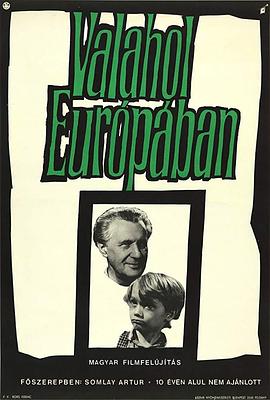简介
Somewhere in the remote region, the war ends. In the midst of ruined cities and houses in the streets, in rural hamlets, everywhere where people still live, are children who have lost their homes and parents. Abandoned, hungry, and in rags, defenseless and humiliated, they wander through the world. Hunger drives them. Little streams of orphans merge into a river which rushes forward and submerges everything in its path. The children do not know any feeling; they know only the world of their enemies. They fight, steal, struggle for a mouthful of food, and violence is merely a means to get it. A gang led by Cahoun finds a refuge in an abandoned castle and encounters an old composer who has voluntarily retired into solitude from a world of hatred, treason, and crime. How can they find a common ground, how can they become mutual friends The castle becomes their hiding place but possibly it will also be their first home which they may organize and must defend. But even for this, the price will be very high. To this simple story, the journalist, writer, poet, scriptwriter, movie director, and film theoretician Béla Balázs applied many years of experience. He and the director Géza Radványi created a work which opened a new postwar chapter in Hungarian film. Surprisingly, this film has not lost any of its impact over the years, especially on a profound philosophical level. That is to say, it is not merely a movie about war; it is not important in what location and in what period of time it takes place. It is a story outside of time about the joyless fate of children who pay dearly for the cruel war games of adults. At the time it was premiered, the movie was enthusiastically received by the critics. The main roles were taken by streetwise boys of a children's group who created their roles improvisationally in close contact with a few professional actors, and in the children's acting their own fresh experience of war's turmoil appears to be reflected. At the same time, their performance fits admirably into the mosaic of a very complex movie language. Balázs's influence revealed itself, above all, in the introductory sequences an air raid on an amusement park, seen in a montage of dramatic situations evoking the last spasms of war, where, undoubtedly, we discern the influence of classical Soviet cinematography. Shooting, the boy's escape, the locomotive's wheels, the shadows of soldiers with submachine guns, the sound of a whistle—the images are linked together in abrupt sequences in which varying shots and expressive sharp sounds are emphasized. A perfectly planned screenplay avoided all elements of sentimentality, time-worn stereotypes of wronged children, romanticism and cheap simplification. The authors succeeded in bridging the perilous dramatic abyss of the metamorphosis of a children's community. Their telling of the story (the scene of pillaging, the assault on the castle, etc) independently introduced some neorealist elements which, at that time, were being propagated in Italy by De Sica, Rossellini, and other film artists. The rebukes of contemporary critics, who called attention to formalism for its own sake have been forgotten. The masterly art of cameraman Barnabás Hegyi gives vitality to the poetic images. His angle shots of the children, his composition of scenes in the castle interior, are a living document of the times, and underline the atmosphere and the characters of the protagonists. The success of the picture was also enhanced by the musical art of composer Dénes Buday who, in tense situations, inserted the theme of the Marseilaise into the movie's structure, as a motive of community unification, as an expression of friendship and the possibility of understanding. Valahol Europaban is the first significant postwar Hungarian film. It originated in a relaxed atmosphere, replete with joy and euphoria, and it includes these elements in order to demonstrate the strength of humanism, tolerance, and friendship. It represents a general condemnation of war anywhere in the world, in any form.
猜你喜欢
-
HD
猎金游戏
主演:刘德华,欧豪,倪妮,黄奕,蒋梦婕,郑则仕,刘以豪,赵海燕,李梦男,田丽,张晨光,连凯,张琪,麦长青,赵永洪 -
HD
某种疯狂
主演:阿什利·代·兰格,Gabe Gabriel,埃文·亨斯特,Loren Loubser,Sandra Prinsloo,Ian Roberts,Melanie Tafila,Luke Volker,埃里卡·韦塞尔斯,艾米·路易斯·威尔逊 -
HD中字
看着我2024
主演:马尔哈兹·阿布拉泽,达塔·恰丘阿,莱万·加布拉瓦,Salome,Gelenidze,Maia,Gelovani,安德罗·贾帕里泽,Vakhtang,Kedeladze,Paata,Kvlividze,Beka,Lemonjava,Marita,Meskhoradze,Eka,Mzhavanadze,Temo,Rekhviashvili,亚姆泽·苏基塔什威利,Giorgi,Gio,Tabidze -
HD
折射2024
主演:艾琳·哈尔,卡特拉·尼亚斯多提,米凯尔·卡贝尔,奥古斯特·维古姆,Gunnar Hrafn Kristjánsson,巴尔德尔·埃纳尔松,索尔斯坦·巴赫曼,Tómas Howser,Alex Leó Kristinsson,Einar Haraldsson -
HD中字
值得的等待
主演:拉娜·康多,安德鲁·浩二,罗斯·巴特勒,姜成镐,艾洛蒂·袁,林嘉欣,周逸之,Ali,Fumiko,Whitney,瑞奇·何,陈琼华,Yu,Beng,Lim -
HD中字
隔楼女孩:我们之间的层距
主演:法缇玛·德查瓦里昆,琪拉娜·皮皮亚克隆,帕贡·查博里拉 -
HD
大风杀
主演:白客,辛柏青,郎月婷,耿乐,孙宁,李晓川,张本煜,卓杰泽仁,李浩天,桑茗胜,李感,李延,薛旭春,萨布,杨帆,李思博,王艺禅,王一通,李蔓瑄 -
HD
万里寻亲记粤语
主演:胡蝶,萧芳芳,欧阳莎菲,王美美,容玉意,姜大卫 -
HD
盲女72小时粤语
主演:叶玉卿,黄秋生,陆剑明,陈友,张坚庭,陈果,陈荣照 -
HD中字
我爱罗兰度粤语
主演:陈百祥,夏文汐,王晶,陈惠敏,董骠,杨雪仪 -
HD
唐朝妖姬粤语
主演:温碧霞,罗嘉良 -
HD
巧破箱尸案粤语
主演:新马师曾,林凤,冯宝宝,司马华龙

